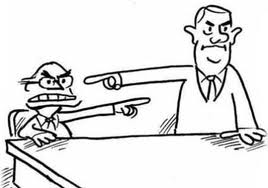

After an experience in an abusive group, the victim needs to understand how he got himself into that predicament in the first place. He needs to ask questions like: How did this happen to me? Whose fault was it? Answering those questions can help prevent being deceived again.
Well, there is a lot of blame to go around. According to the "buyer beware" principle, the victim is partly at fault for being too trusting and deceivable. But the main culprits are the liars who trapped him. We don't put victims of other frauds (e.g. financial fraud) in jail even if they were naive. We only put the perpetrators in jail.
I put together a list of people, institutions, and organizations who share some of the blame. A few of the items on the list require a bit of explanation, which can be found in the footnotes.
In no particular order, here are some of those who deserve a share of the blame.
Well, that's my list. I hope I didn't miss anything major.
In my view, most of the blame goes to those who knew, or should have known, that they are promulgating error but did little or nothing about it.
Footnotes:
1. Actually, certain religious frauds are already illegal. It might be possible to sue some of these churches in some jurisdictions. I don't know if that is possible, but I wouldn't rule it out. It's been done before, e.g. the Church of Scientology has successfully been sued.
I'm not talking about making doctrinal errors illegal, just outright frauds, e.g. publishing altered versions of someone's writings without informing the reader of the alterations or why they were made. If that's not illegal, it should be.
By the way, if some church publishes material with the author's name on it (e.g. Herbert Armstrong's name) and they misquote the author by altering his words, is that not bearing false witness to what he said and stood for? How can a church can justify such actions? Yet it is our understanding that some of Herbert Armstrong's works have been altered and republished without the readers being told about critical doctrinal changes that were made.
2. The insecure global system makes people seek safety in religion. It also makes people uncertain of the future, which makes prophecy seem attractive because prophecy claims to explain where world events are leading and the basic causes behind them.
3. After spending over 100 hours (estimated) researching "global warming" I'm now convinced most of what we hear is hype. Many religious people think weather is getting worse and that this is proof that the end is near, as prophesied by Jesus. Therefore I blame the media for unwittingly creating end-time hysteria. Their intent often seems to be to exaggerate what they think is a real phenomenon in order to "save the planet", but the effect is to play into the hands of apocalyptic groups. Many of the increased costs from bad weather are just due to monetary inflation and increased populations in urban areas.